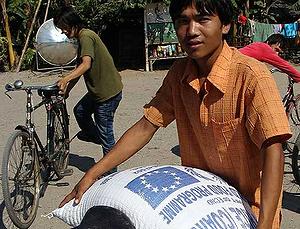One Billion People Go Hungry - Food, Funds in Short Supply
WASHINGTON, DC, July 31, 2009 (ENS) - A billion people around the world are going hungry every day, but the world's response to their urgent need for food is flagging, so critical food assistance is already being cut, the head of the world's largest humanitarian organization is warning.
World Food Programme Executive Director Josette Sheeran said Thursday the UN agency aims to feed 108 million hungry people in 74 countries this year, but is facing "dangerous and unprecedented" funding shortfalls.
 |
For two decades, 100,000 Bhutanese refugees have lived in refugee camps in southeastern Nepal. This young man receives a bag of grain from the WFP. (Photo by Anne Poulsen courtesy WFP) |
"Our budget for this year of assessed and approved needs is US$6.7 billion and we expect from our projections and working with government to come in at 3.7 billion," Sheeran said at a press briefing in Washington ahead of meetings at the White House.
The World Food Programme is funded entirely through voluntary contributions, most of which come from governments.
"We are actively cutting $3 billion of our program, which means a reduction in rations and programs throughout the world, including those to the world's most vulnerable people," said Sheeran, a former U.S. under secretary for economic, business, and agricultural affairs in the State Department during the administration of President George W. Bush.
In Bangladesh, home to some of the world's hungriest people, a WFP programme set up to give meals to 300,000 children in school will now reach only 70,000, Sheeran said
In Guatemala, funding shortfalls could mean that in August, around 100,000 children under the age of five, and 50,000 pregnant and lactating women are going to lose their supply of Vitacereal – a nutritious blend of maize, soy and micronutrients.
In Kenya, hunger is on the rise following the failure of the long-rains season in marginal agricultural lowlands and pastoral areas. WFP will run short of cereals in August, and the 3.2 million Kenyans living in arid and semi-arid areas who had been receiving a normal ration will now face reductions in the amount of food they are given.
In Zimbabwe, food insecurity persists despite improvements in agricultural production and a more liberal import policy this year, according to a report issued in June by the UN Food and Agriculture Organization and the World Food Programme. The report estimates that 2.8 million people will face food shortages in the coming year.
Sheeran said the world is "rightly" looking for sustainable solutions to the world hunger problem and she commended the Group of Eight industrialized democracies for their $20 billion pledge to boost global food security made earlier this month at the G8 meeting in Italy.
 |
At the Major Economies Forum with the G8 in Italy, Indian First lady Gursharan Kaur ladles some corn soya blend porridge as Nigerian First Lady Hajia Turai Yar'Adua looks on. (Photo by Giulio D'Adamo courtesy WFP) |
She said the pledge, which focused on agricultural development, showed that the industrialized world "takes the food security issue seriously."
The G8 countries committed to a goal of mobilizing $20 billion over three years "through a coordinated, comprehensive strategy focused on sustainable agriculture development, while keeping a strong commitment to ensure adequate emergency food aid assistance," the government leaders said in their declaration.
While welcoming the G8 pledge, Sheeran said the world needs to recognize the urgent need to buy food for distribution to the people suffering from hunger and poverty, whose number now exceeds one billion.
"The problem is not all about agricultural yields," Sheeran said. "The challenge is people cannot get access to food – whether because of poor infrastructure or because they can't afford it."
Food security has many environmental dimensions, the G8 leaders recognized. "Effective food security actions must be coupled with adaptation and mitigation measures in relation to climate change, sustainable management of water, land, soil and other natural resources, including the protection of biodiversity," they declared.
The food crisis is not over in the developing world, WFP analysis confirms. In fact, the situation is more alarming in many countries than it was a year ago as the impact of high food prices is compounded by the recent financial crisis, Sheeran said.
 |
Josette Sheeran and Bono raise their cups backstage in Amsterdam. (Photo by Rebecca Richards courtesy WFP) |
New data from the UN Food and Agriculture Organization suggests food prices are higher today than a year ago, at the height of the global food crisis, in more than 80 percent of developing countries.
Sheeran, who praised the Obama administration for prioritizing the issue of food security, is in Washington to urge policymakers to keep focused on urgent hunger needs as they seek to craft long-term solutions to hunger.
Looking forward to September's G20 meeting in Pittsburg, which will be chaired by President Barack Obama, she said WFP is calling upon the group "to take action not only on the financial crisis, but also on hunger."
The United States is the world's largest food aid donor and provides approximately half of all food aid to vulnerable populations throughout the world.
U2 singer Bono Vox, widely known for his determination to find solutions to the problems afflicting Africa, got an update on global hunger Sunday in a backstage meeting with Sheeran, before the Irish band's sold-out concert at Amsterdam's ArenA stadium.
During their meeting, Sheeran gave the singer one of the distinctive red cups which symbolize WFP's Fill the Cup campaign to raise funds to help the 66 million children in the world who go to school hungry.
Bono acknowledged that the number of hungry people in the world is “rising fast” and expressed admiration for WFP's work providing free meals to more than 20 million children in school every year.
Copyright Environment News Service (ENS) 2009. All rights reserved.
To subscribe or visit go to: http://www.ens-newswire.com